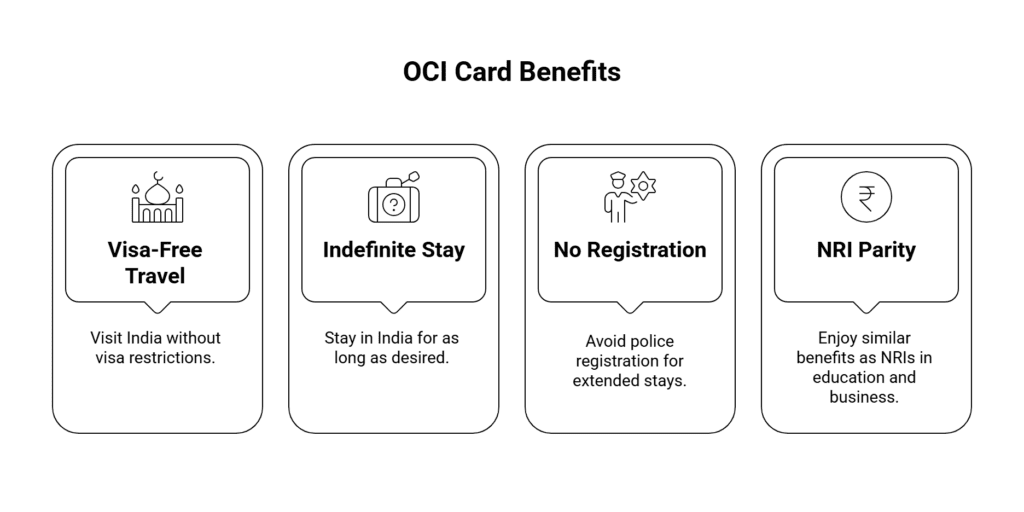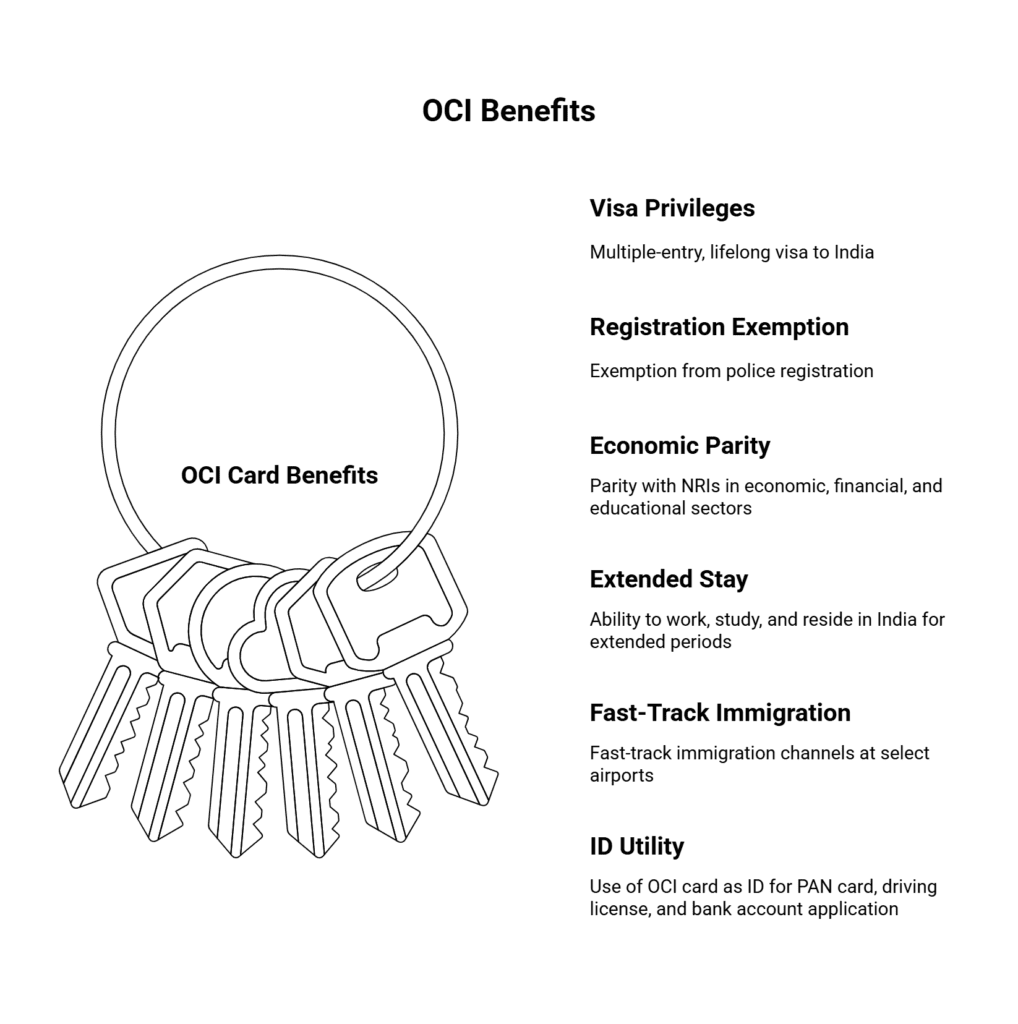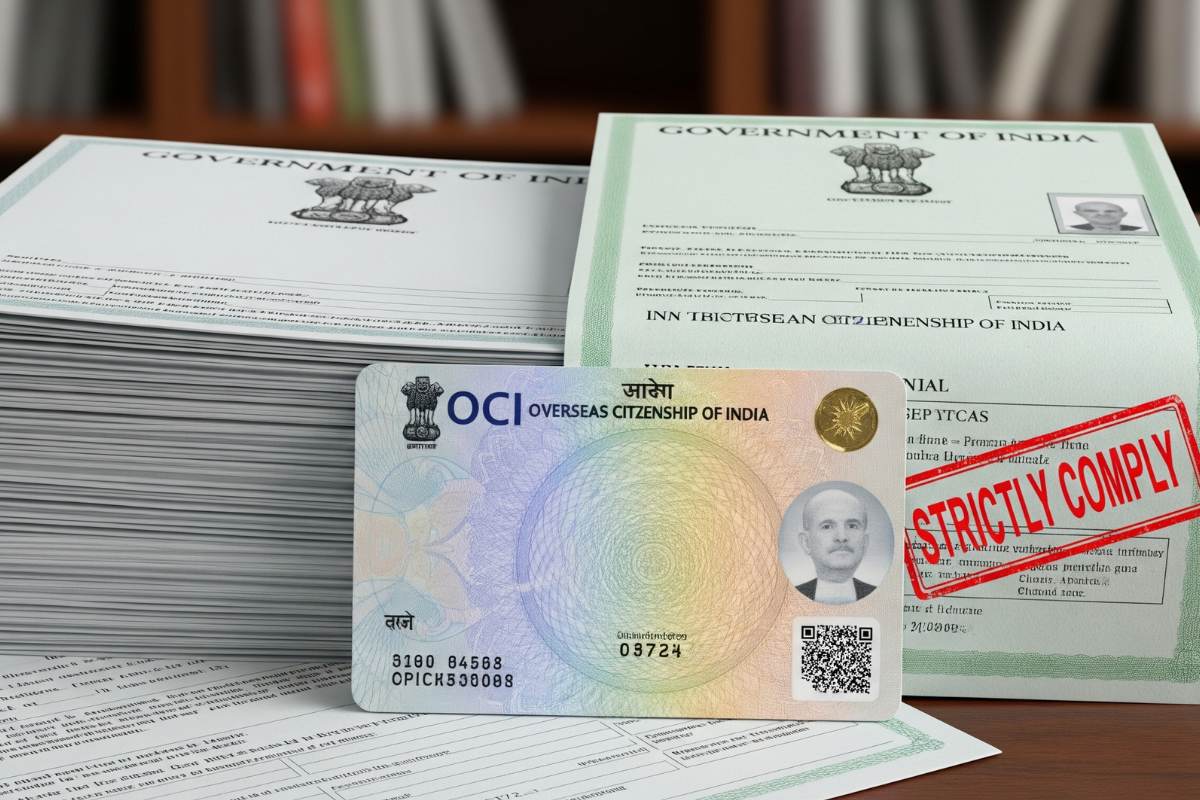You might have believed that an Overseas Citizen of India (OCI) card was a lifetime ticket to visiting the homeland. Well, it used to be. But, as of August 2025, the Indian government has swung the regulatory pendulum. New norms, tighter, more uncompromising than ever, are now in force. And if you’re an OCI cardholder, there’s much you need to unpack, sooner rather than later.
Let’s break it down. In short? Serious criminal convictions and charge sheets can now spell the end of your OCI privileges, no matter how deep your roots run or how long ago you registered.
What Is an Overseas Citizenship of India (OCI) Card?
Picture this: The OCI card is not Indian citizenship, but rather something akin to it, serving as an immigration bridge for people abroad who trace their roots to India. This travel document evolved from earlier schemes, with the first OCI program starting in August 2005.
An OCI card lets Indian-origin foreign nationals:

- Visit India visa-free, as many times as they like.
- Stay for indefinite periods, no more visa headaches.
- Skip police registration, even for long stays.
- Enjoy parity with Non-Resident Indians (NRIs) in areas like education and some business opportunities.
Here’s the kicker, though: It doesn’t grant political rights. Voting, holding legislative or constitutional posts? Those remain strictly off-limits. You can’t buy agricultural land, either, no matter how green your thumb.
How the OCI Card Landscape Changed in August 2025
You know, new rules from India’s Ministry of Home Affairs (MHA) didn’t come out of nowhere. For years, authorities mulled over tightening controls, especially where criminal or security concerns were flagged.
Now, with a recent gazette notification (August 2025), things are different. Under Section 7D of the Citizenship Act, OCI registration faces cancellation on two major fronts:
- If convicted and sentenced to imprisonment for 2 years or more.
- If named in a charge sheet for an offense with a 7-year jail term or greater.
Believe it or not, these restrictions now apply for life. Previous rules had a 5-year window from registration; that’s history.
What Exactly Changed? A Deep Dive
Let’s spell it out in bullet points:
- Conviction Rule: If an OCI cardholder is convicted and faces at least 2 years behind bars, their card can be revoked, no matter when the conviction took place.
- Chargesheet Rule: Even if not convicted, but named formally in a charge sheet for an offense that could land you in prison for 7 years or more, the card can be axed.
- No Time Limit: Earlier, only convictions within 5 years of OCI registration threatened cancellation. Now, the rule is timeless; it applies retroactively and prospectively.
- Other Grounds for Revocation: Fraud in registration, national security concerns, violation of Indian law, and prejudicial activities all remain valid reasons for cancellation.
Funny thing is, these changes now make the OCI card a privilege, not a guaranteed lifetime right.
Who Qualifies for an OCI Card? Eligibility Essentials
Here’s what the law says: no hedging.
- Anyone who was an Indian citizen (or eligible to be one) as of January 26, 1950.
- Descendants: Children, grandchildren, great-grandchildren of such Indian citizens.
- Minor children with one parent holding Indian citizenship.
- Spouses of foreign origin married to an Indian citizen (or OCI cardholder), if the marriage has been registered and subsists for at least two years.
There are clear exclusions:
- Anyone who, or whose parents, grandparents, or great-grandparents, has been a citizen of Pakistan, Bangladesh, or any country that the Indian government notifies in the official gazette, is not eligible.
Rights: What’s Permitted, and What’s Not?
The OCI card offers several perks, but also carries strict boundaries. Let’s lay them out:

Permitted:
- Multiple-entry, multi-purpose lifelong visa to India.
- Exemption from police registration.
- Parity with NRIs in most economic, financial, and educational sectors.
- Ability to work, study, and reside in India for extended periods.
- Fast-track immigration channels at select airports.
- Use of OCI card as ID for PAN card, driving license, and bank account application (while residing in India).
Not Permitted:
- No voting rights.
- Cannot contest or hold legislative, parliamentary, or constitutional posts.
- Cannot buy agricultural or plantation property.
- Restrictions on certain professional appointments (public services, except by special government order).
Renewal Rules, Compliance, and Smart Card Rollout (2025)
Gone are the days of frequent OCI card renewals. Here’s the new ritual:
- Re-issuance is required only once:
- When issuing a new passport after age 20.
- When issuing a new passport after age 20.
- For children and elders:
- Must upload online a copy of their new passport and latest photo every time a fresh passport is issued (up to age 20, and once after turning 50).
- Foreign spouses must also upload new documentation with each passport change, and a declaration that the marriage subsists.
- The uploading process: Required within three months of receiving the new passport.
- Must upload online a copy of their new passport and latest photo every time a fresh passport is issued (up to age 20, and once after turning 50).
- Fees stand at roughly USD275, variable by location and additional services.
What’s got people talking? 2025 marks the rollout of digital OCI smart cards, designed to streamline travel, compliance, and border security.
Why Tighten the Rules? The Government’s Perspective
Here’s the kicker. The government has consistently emphasized that the OCI card is a travel privilege, aimed at strengthening people-to-people ties and not conferring citizenship.
The motivation? Security. India’s home ministry and immigration authorities cite concerns over increasing fraudulent registrations, national security threats, and cases of abuse, especially by those with serious criminal backgrounds.
And let’s be honest: with over 4.5 million OCI holders globally, the largest groups in the US, UK, Australia, and Canada, the stakes for effective screening have never been higher.
Impact on the Global Indian Diaspora
If you’re part of the diaspora, living, say, in New York, London, Sydney, or Toronto, the new rules cast a wide net. Conviction for major offenses, or just being named in a serious criminal charge sheet, could mean losing your right to visit or work in India. Authorities warn: Revoked OCI holders will not be allowed entry, even for family emergencies, business, or holidays.
Current data (2014-2025):
- OCIs cancelled for criminality/fraud: 122 cases (2014-2023)
- Further cancellations: 57 in 2024; 15 in early 2025.
So, if you’re holding an OCI card, best keep those legal records squeaky clean.
Frequently Asked Questions (FAQ)
What happens if my OCI card gets cancelled?
- Immediate travel ban to India.
- All associated privileges, employment, property, and education are revoked.
- Legal appeals can be filed, but the final decision rests with the government.
What if I was convicted years ago, before the new rules?
- The cancellation applies retroactively: If the offense qualifies (2 years jail or chargesheet for a 7-year+ crime), your card is at risk.
Are minor traffic offenses or civil cases grounds for cancellation?
- No. Only serious criminal convictions and charge sheet inclusions for major offenses apply.
I have an OCI card, but one of my parents was a citizen of a prohibited country. Am I eligible?
- No. Any parent, grandparent, or great-grandparent who held citizenship of Pakistan, Bangladesh, or other government-notified countries disqualifies applicants.
Can I buy a house or farmland in India as an OCI cardholder?
- Private property is okay (subject to local laws), but agricultural and plantation land is off-limits.
How much time do I have to upload new passport/photo details?
- Three months after a new passport is issued.
Additional Compliance: Special Permits Required
Here’s something folks often overlook. Post the 2021 gazette updates, OCI cardholders need special permission for:
- Research projects in India
- Missionary or journalistic work
- Visiting restricted/protected regions (Jammu & Kashmir, Arunachal Pradesh, etc.)
So, even for travel, don’t forget to check for additional requirements.
Case Studies: Real-World Scenarios
- Case 1: An OCI holder in the UK, convicted of fraud, sentenced to 30 months’ jail. Under new rules, their OCI is cancelled, and entry is banned.
- Case 2: An American OCI holder charged (though not convicted) with a serious assault crime that carries a 9-year maximum sentence. OCI revoked based on inclusion in the charge sheet.
- Case 3: An Australian with OCI and a speeding ticket, fined but not imprisoned. No action taken; minor offenses aren’t covered.
The Digital Era: Towards Smarter Compliance
India’s 2025 digital smart card initiative for OCIs isn’t just about convenience; it’s about tighter control, centralized monitoring, and real-time compliance tracking.
Authorities will now have instant access to updated data, so outdated information won’t fly. You, as a cardholder, must ensure every new document, photo, or compliance action is recorded online promptly.
Quotes & Opinions: Government and Legal Voices
“OCI registration shall be liable to get cancelled when a person has been sentenced to imprisonment for a term of not less than two years or has been charge-sheeted for an offence carrying punishment of imprisonment for seven years or more.” – MHA Gazette Notification, August 2025
“OCI status is a privilege, not a right, and will be heavily scrutinized for criminality or security matters,” the government emphasizes, repeating its resolve for ‘zero tolerance’ on abuse.
Conclusion: The Takeaway for Every OCI Holder
Let’s face it. India’s updated overseas citizenship guidelines are a wake-up call for millions worldwide. With criminal rules stiffened, time limits erased, and digital compliance gaining traction, the message couldn’t be clearer:
- OCI is a privilege, one that advantages, but doesn’t entitle.
- Keep those records clean; minor infractions may slide, but serious charges spell the end.
- Know your eligibility, follow compliance, update your documents, and monitor legal developments.
Because, if I’m honest, in today’s new regime, one mistake, however distant, can close the door on your Indian roots. Stay informed, stay compliant, and, most of all, stay aware.
Related Topics & SEO Keywords
Overseas Citizenship of India | OCI Card Cancellation Rules | Indian Diaspora Laws | OCI Cardholder Rights | India Immigration Policy | India Visa-Free Entry | OCI Rules 2025 | OCI Card Renewal Process | Criminal Charges and OCI | MHA Gazette Notification | Indian Citizenship Act Section 7D | NRI Travel Regulations
Quick Reference Table: OCI Rules (2025 Update)
| Key Topic | Old Rule | New Rule (Aug 2025) |
| Conviction & OCI | Cancellation for 2+ years jail within 5 years | Cancellation ANY TIME after conviction (2+ yrs jail) |
| Chargesheet & OCI | Not covered | Cancellation if named for 7+ yrs’ punishment |
| Renewal Process | Reissue at each passport renewal (children/elders) | 1-time reissue after turning 20 years; online update otherwise |
| Eligibility | Indian origin plus exclusions | Excludes those linked to Pakistan, Bangladesh, and others |
| Political Rights | No voting, no office | Unchanged |
| Property Ownership | No agriculture/plantation buying | Unchanged |
| Smart Cards | Not available | Digital rollout in 2025 |
Final Note
If you hold an OCI card, or hope to, take this as an invitation to be vigilant. Rules can change in a heartbeat, authorities can act faster than ever, and the price of not paying attention… well, that’s permanent. Stay tuned. Stay sharp. And, if you ever have doubts about your OCI status, check, triple-check, and never assume.








